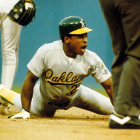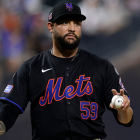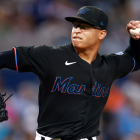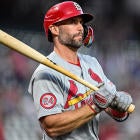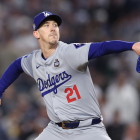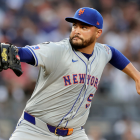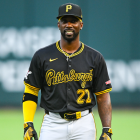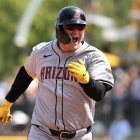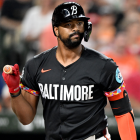On Monday night, the Washington Nationals lost for the 16th time in their last 22 games (BOS 4, WAS 3), dropping them to 42-41 on the season. They were done in by Rick Porcello's bases-clearing double against Max Scherzer, of all things.
Here's video of Porcello's three-run two-bagger:
Aside from a grand slam, I'd say that's pretty much the last thing anyone expected in that spot. Scherzer is so good and he makes legitimate major-league hitters look silly. An American League pitcher clearing the bases in a two-strike count? That's not supposed to happen.
And yet, it did happen, and the Nationals continue to sink in the standings. They are now in third place in the NL West, seven games behind the Atlanta Braves. They're also 3 1/2 games back of the second wild card spot with four teams ahead of them in the standings. The club's postseason odds are not pretty. Via SportsLine:
- Opening Day: 96.3 percent to make postseason (93.5 percent to win NL East)
- After 83 games: 44.5 percent to make postseason (24.4 percent to win NL East)
The Nationals certainly aren't out of the race -- there's still close to half-a-season to play, after all -- but they've exhausted their margin of error. It is projected to take 88 wins to capture the second NL wild-card spot. The Nationals have to go 46-33 the rest of the way to get there. That's a .582 winning percentage, or 94 wins across a full 162-game season. Doable? Sure. SportsLine projected Washington as a 98-win team before the season.
That said, these Nationals are clearly not the team everyone expected coming into the season. Bryce Harper is not having an MVP caliber season. Daniel Murphy missed most of the season recovering from knee surgery and hasn't hit much when healthy. Stephen Strasburg, Ryan Zimmerman, and Matt Wieters have been on the disabled list for long stretches of time. There are a lot of things going wrong and not enough going right. That's how you lose 16 times in 22 games and toe the .500 line at the halfway point.
Clearly, the Nationals want to get to the postseason and they're making moves accordingly. They acquired shutdown reliever Kelvin Herrera two weeks ago. They're said to have interest in Matt Harvey (!) and Raisel Iglesias. GM Mike Rizzo wants to improve and get this club to the postseason. Rizzo's never been shy about making trades to improve his roster and I expect him to be aggressive these next few weeks.
What if it doesn't work though? Just hypothetically -- humor me for a second -- say the Nationals are unable to pull out of this recent skid and are something like 10 games back in the division and seven games back of the second wild-card spot come the trade deadline. I don't think it'll happen, but I also didn't think the Nationals would be 42-41 after 83 games.
And, if that does happen, would Rizzo be willing to sell at the trade deadline? Specifically, would he be willing to trade Harper, an impending free agent?
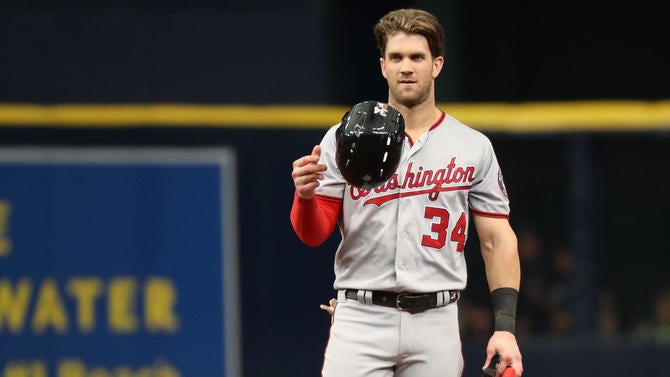
A full-blown rebuild almost certainly won't happen. I think it would be more of a retooling effort. Shuffle the roster a bit and prepare to make another run next season. That sort of thing. Harper is a very unique case though because, despite his relatively disappointing season, he is immensely talented and fully capable of playing like the best player in baseball in August and September. He's an impending free agent and he would be in demand.
I think two things would need to happen for Rizzo and the Nationals to consider trading Harper.
- The Nationals fall out of the race. I mean really fall out of it. Seven back of the second wild-card spot is still within striking distance. This 6-16 skid would have to turn into, say, 11-29 over this next month. The Nationals would have to collapse, basically.
- The Nationals determine an extension is impossible. Rizzo and Scott Boras, Harper's agent, have a great working relationship. That said, Boras tends to take his top clients into free agency, and Harper is poised for a record contract. Rizzo and the Nationals would have to determine there's no shot at an extension, and to retain Harper long-term, they'd have to win a free-agent bidding war.
The best-case scenario here is bouncing back from the 6-16 stretch and qualifying for the postseason. The next best-case scenario is trading Harper for gobs of young talent, then re-signing him as a free agent. That's what the Yankees did with Aroldis Chapman in 2016. They shipped Chapman to a contender for a package that included Gleyber Torres, then re-signed Chapman as a free agent. If the Nationals aren't going to make the postseason, that's the next best thing. The ol' trade-and-re-sign trick.
Which teams could have interest in Harper? I reckon lots despite his .217 batting average. The Phillies could use a right field upgrade. The Indians have needed another outfielder for what feels like three years now. The Diamondbacks absolutely need another bat. The Astros have had a revolving door in left field all season. Would the Giants get involved? I'd never rule out the Cubs, Dodgers, Red Sox, or Yankees in a situation like this either, no matter how unlikely it may seem.
The Nationals have been a very streaky team this season. At one point in April they went 7-16 during a 23-game stretch. They followed that up with a 22-6 stretch in May. Now they're in this current 16-6 skid. It would not surprise me in the least to see this Nationals team start another hot streak as soon as Tuesday night. They have a talented roster. It's not like they're trying to feign contention with retreats. Start a roster with Harper, Scherzer, Strasburg, Anthony Rendon, Trea Turner, and Juan Soto and you're in great shape.
If the Nationals do continue to stumble, however, and their postseason odds diminish further prior to the trade deadline, the club may be forced to make a tough decision about Harper's future. Missing the postseason and then losing Harper for nothing but a draft pick in free agency would be a devastating blow to the franchise.
Sometimes difficult decisions have to be made. The Tigers traded Justin Verlander. The Pirates traded Andrew McCutchen. The Rays traded Evan Longoria. Those teams didn't want to make those deals, but they did because it was in the franchise's best interests. In the unlikely event they continue to fade in the standings, the Nationals may soon face a similar decision with Harper.










